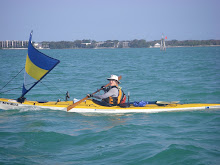 I’ve been avidly watching Freya's progress around NZ’s South Island, or the “mainland” as the South Islanders like to call it. Keeping up with how her equipment’s coping is always interesting, as with any expedition. One bit of her gear that’s pretty much given up the ghost, and is awaiting replacement, is her skeg. Only a few days into her trip she encountered problems with, what she so colourfully called, “this f*&%^% skeg”.
I’ve been avidly watching Freya's progress around NZ’s South Island, or the “mainland” as the South Islanders like to call it. Keeping up with how her equipment’s coping is always interesting, as with any expedition. One bit of her gear that’s pretty much given up the ghost, and is awaiting replacement, is her skeg. Only a few days into her trip she encountered problems with, what she so colourfully called, “this f*&%^% skeg”.I’ve often wondered at this archaic European (read: British), and somewhat also American, fixation for a skeg, as someone (Kiwi) once called “a failed rudder”. They often go wrong and the skeg box takes up valuable room in the aft hatch.
As naval architect John Winters notes, “because a rudder can develop greater lift by increasing the angle of attack relative to the flow, it is more effective than a skeg.”
Many of my local paddling pals have skegs, and are always tut-tutting at rudder users, mainly complaining that we have none of the skills necessary to paddle without a rudder. Pshaw! That’s near the same mentality that had the British struggling in their amateur way towards the South Pole, decrying those who did have the correct gear and experience for the job. Many rudder users started off with skegs, and dutifully learned those skills. Now that many of us have upgraded to rudders, we can appreciate the benefits that a rudder can add to the kayaking experience, particularly on an expedition-type trip with rough and windy conditions.
As Paul Caffyn explained, having completed circumnavigations of New Zealand, Australia, Ireland, the UK, Japan and this year part of Greenland, he averaged 31 miles per day in kayaks with no skeg or rudder, 34 miles per day in kayaks with skegs, and 39 miles per day in kayaks with rudders.
I’m sure that Freya will have noticed around the coast of NZ, that all the Kiwi boats which join her for a few hours have rudders. This isn’t because Kiwi paddlers don’t have skeg-only-related skills, it’s because they know what’s best for the tough conditions the NZ coastline and weather throws at them. Justine and Barry will also find this. Give them their credit, the Ozzies feel just the same – Laurie Ford is a true rudder proponent, refining them now for nigh on 30 years for his local Tassie conditions.




7 comments:
Are you sure you really want to open up this discussion? My personal opinion: it's not about conditions, or paddler skills(clearly skills are needed for conditions). It's about the boat, some paddle fine without either, some require a skeg, some paddle best with rudders. Not sure why everyone makes such a big deal about it.
I don't like the way the rudder can hook and break my fishing line when I'm trolling. I've also found that climbing up on the back deck of my ruddered boats when practicing re-entries can create uneasiness regarding certain tender bodily parts ;)
I see a fight brewing in the school yard!! :-)
I love this debate and have, until recently believed rudders were things that got in the way and, most importantly, were waiting to break when most needed. Then Gary, a local paddler, pointed out that in NDK boats one has far more trouble with the skeg than anyone ever had with a rudder. He is right. The debate goes on...and on...
Love a good debate ;)
Rudders and cold water paddling are not happy partners once various parts begin freezing up and so on. Still, I agree as well with Dawn in that some boats (like my QCC) absolutely require a rudder, others (like my SOF) don't.
Of course, in life, it always helps to have a good rudder, and a wise helmsman...
Or woman...
Post a Comment